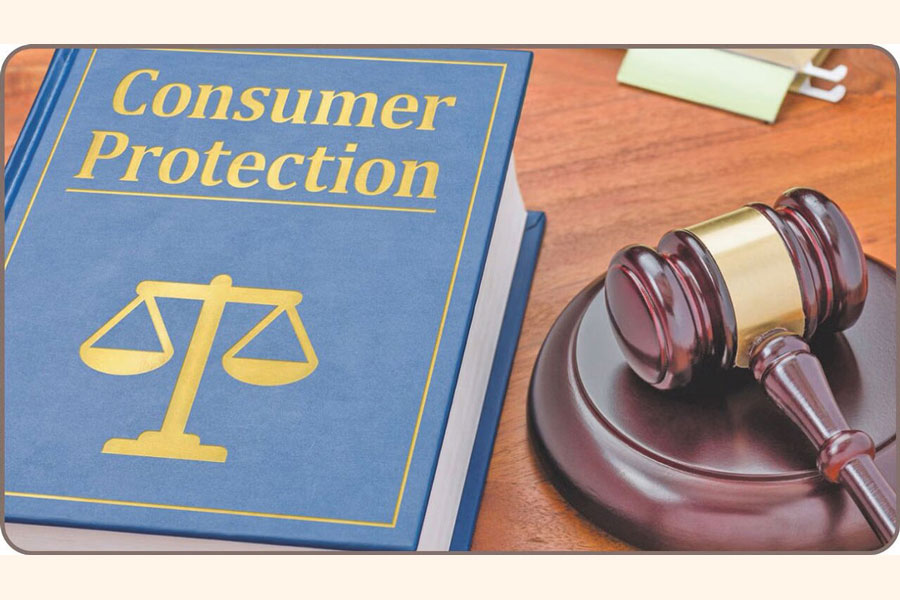
Published :
Updated :

Strange though, consumer rights did not figure with any prominence in our governmental or social priorities even a few decades back. The lack of awareness regarding these rights meant that consumers either did not realise they had legal protection or simply accepted unfair market practices as an unavoidable reality. However, the scenario has changed significantly over the years. With an increasing number of deceptive and exploitative business practices taking a toll on consumers, awareness of consumer rights has become more crucial than ever.
The enactment of the Consumer Rights Protection Law in 2009 was no doubt a significant milestone, as it formally recognised and defined unfair practices in the marketplace while providing a legal framework for consumer protection. The law's scope is extensive, covering not only pricing and product quality but also the entire production and marketing process, including advertisements designed to influence purchasing decisions. While the enactment of this law was a positive step, its effectiveness has been severely compromised due to the absence of a proper enforcement mechanism. Consequently, the law has largely remained a well-intended declaration rather than a practical safeguard for consumers.
Protecting consumer rights requires more than just enacting legislation. Consumer protection, in its broader sense, encompasses laws and regulations that ensure fair interactions between service providers and consumers. A robust consumer protection framework typically includes: enhanced transparency and awareness about products and services, Promotion of competition in the marketplace, prevention of fraudulent activities, consumer education, elimination of unfair business practices
To translate these principles into reality, an efficient, institutionalised mechanism is essential. While the government did establish the Directorate of Consumer Rights Protection in accordance with the key provisions of the aforementioned law, its impact has been negligible. According to media reports, the directorate's primary function has been limited to receiving complaints rather than actively addressing violations or preventing malpractice.
A major shortcoming of the law is its lack of specificity in defining the responsibilities of the directorate. Experts argue that the vague administrative role assigned to the directorate has hindered its effectiveness. Furthermore, the directorate is not sufficiently empowered to direct relevant state agencies to take necessary actions. Additionally, it lacks institutional capacity, including specialised personnel for market monitoring and regulatory enforcement.
Since the interim government took charge, the media has reported occasional raids on supermarkets and local markets, particularly in the capital city. While these sporadic actions may create temporary disruptions, they do little to establish a long-term solution for consumer protection. Without a well-structured enforcement mechanism, these random inspections fail to bring about meaningful change.
The lack of systematic oversight has led to a business environment rife with malpractice. Consumers are often left with no choice but to purchase substandard or even hazardous products. The proliferation of counterfeit medicines, pesticide-laden vegetables, and toxic-laced cosmetics is alarming. The problem of formalin-treated fruits and vegetables, which pose severe health risks, remains widespread. These instances highlight not only blatant violations of consumer rights but also grave threats to public health and safety.
Given the state of things, it is clear that the lack of consumer representation as a market stakeholder has resulted in a power imbalance, where businesses operate with minimal accountability. Consumers are frequently subjected to deception, ranging from false advertising to undisclosed harmful ingredients in products. The absence of stringent regulatory measures allows businesses to prioritise profit over consumer safety and ethical practices. Moreover, the issue extends beyond the quality of goods. Pricing manipulation, hoarding, and artificial inflation of essential commodities are common problems that consumers face. During times of crisis, such as natural disasters or pandemics, these exploitative practices tend to worsen, exacerbating the plight of the average consumer.
Addressing these challenges requires a multi-faceted approach. Since the legal framework is already in place, the focus should now shift toward effective enforcement and consumer empowerment, through:
Strengthening the Directorate of Consumer Rights Protection: The directorate must be given clear jurisdiction and authority to take decisive action against unfair trade practices. It should be equipped with a specialised task force dedicated to market monitoring and regulatory compliance.
Enhancing Legal Enforcement: The government should introduce stricter penalties for businesses found guilty of consumer rights violations. Establishing fast-track courts for consumer grievances could expedite justice and deter unethical practices.
Public Awareness Campaigns: Nationwide awareness campaigns, in collaboration with consumer rights organisations and the media, can help educate consumers about their rights and encourage them to report violations.
Collaboration with Civil Society and NGOs: A collaborative effort between the government and these non-government organisations could lead to more effective monitoring and policy recommendations.
Technology-Driven Consumer Protection: Establishing an online complaint portal and a mobile application for consumers to report grievances can streamline the process of addressing complaints. This would also enhance transparency and accountability in dealing with consumer issues.
Encouraging Ethical Business Practices: Businesses should be encouraged to adopt ethical practices through incentives such as tax benefits or public recognition for companies that adhere to consumer protection guidelines. Industry watchdogs and independent certification bodies can help promote ethical standards in various sectors.
The protection of consumer rights is not just a legal necessity; it is an ethical obligation that ensures fair competition, enhances market efficiency, and safeguards public health. Moving beyond rhetoric, concrete steps must be taken to uphold these rights, making consumer protection a fundamental pillar of economic governance.
wasiahmed.bd@gmail.com


 For all latest news, follow The Financial Express Google News channel.
For all latest news, follow The Financial Express Google News channel.